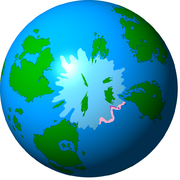South Sea penguin: Difference between revisions
mNo edit summary |
m (Craitman moved page South Sea Penguin to South Sea penguin) |
||
| (One intermediate revision by one other user not shown) | |||
| Line 19: | Line 19: | ||
==Behaviours== | ==Behaviours== | ||
[[File:Range of the South Sea Penguin.png|thumb|left|180px|'''Range | [[File:Range of the South Sea Penguin.png|thumb|left|180px|'''Range:''' pink.<br>'''Breeding colonies:''' purple.]] | ||
Adult South Sea Penguins spend much of their lives in the cold waters of the South Sea, hunting small fish and squid. It is unknown how long the penguins can remain submerged for, but anecdotal evidence suggests it could be for around 20 minutes, during which time the bird can dive to a depth of up to 500 metres. | Adult South Sea Penguins spend much of their lives in the cold waters of the South Sea, hunting small fish and squid. It is unknown how long the penguins can remain submerged for, but anecdotal evidence suggests it could be for around 20 minutes, during which time the bird can dive to a depth of up to 500 metres. | ||
Latest revision as of 20:02, 18 April 2022
Scientific Name: Eudyptes Microme  |
|
Physical Description Body Type: Flightless bird Biological Information Diet: Carnivorous |
The South Sea Penguin is a small, semi aquatic, flightless bird native to the southern icecap of Micras. While the species has traditionally enjoyed a stable population, recent habitat degradation has give rise to the South Sea Penguin Conservation Project in 1693 AN with the intention of stabilising and increasing the population of the birds.
The South Sea Penguin is distinctive in appearance, with an average height of 45cm and clear, well-defined black and white plumage, and a dark pink or red beak. The males of the species develop a yellow crest during adolescence, which is used during the species' mating dance, during which the male moves moves its head in a figure eight while initiating a shoulder shimmy and elaborate tap dance.
Behaviours
Adult South Sea Penguins spend much of their lives in the cold waters of the South Sea, hunting small fish and squid. It is unknown how long the penguins can remain submerged for, but anecdotal evidence suggests it could be for around 20 minutes, during which time the bird can dive to a depth of up to 500 metres.
When not feeding, the penguins can most often be found resting on the ice shelves of the southern icecap, or atop vast drifting icebergs. The only known populations of the birds near human settlements are on the South Sea Islands, with Trinity Island hosting one of the largest colonies on Micras.
South Sea Penguins pair and mate for life, with each couple producing three eggs per season. While it is rare for all three hatchlings to reach maturity, both genders of penguin contribute to the incubation of eggs and the feeding of young. The nests of the penguins are often observed to be elaborately decorated with sea shells and other debris, though it is now known whether this serves any practical purpose.
The penguins have a well developed system of calls and cries, and are believed to sing recreationally, particularly when nursing young chicks.
Popular Culture
The South Sea Penguin is the national bird of the South Sea Islands, where penguin colonies have become tourist attractions over time. This has given rise to a variety of penguin-themed merchandise, as well as the popular children's TV series Chardonnay the Penguiness.
